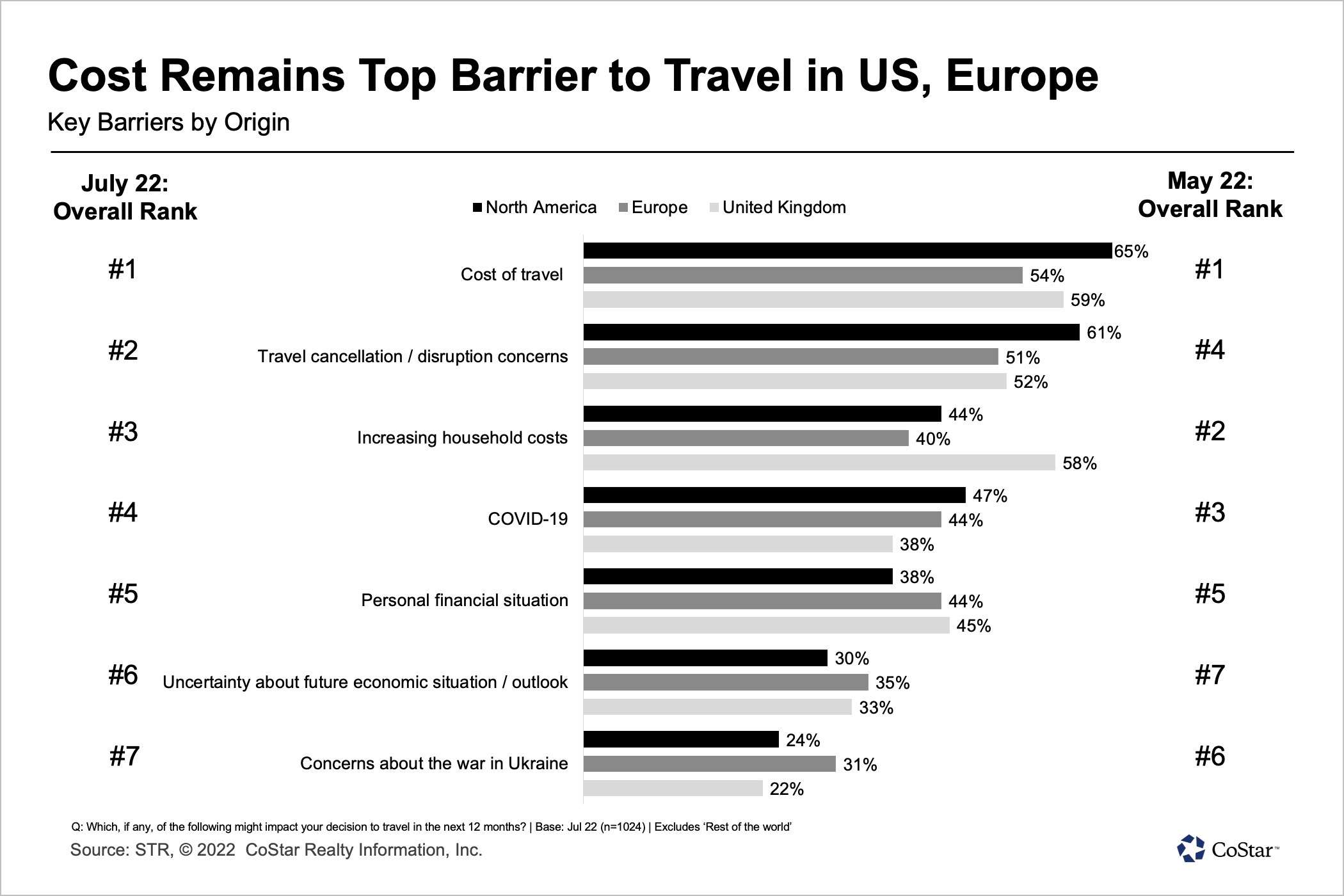During much of the year so far, hoteliers have benefited from the release of pent-up demand and easing COVID-19 concerns. However, as the industry in the Northern Hemisphere transitions from peak summer months to shoulder periods of the fall, there are new challenges accompanying the seasonal decline in demand that pose a threat to growth.
Concerns about increasing cost of living as inflation hits record highs in many countries and worries about travel disruption linked to staffing issues are affecting the industry.
July 2022 consumer research from STR, CoStar’s hospitality analytics division, sheds light on attitudes towards these and other issues currently influencing travel. The findings reveal a mixed outlook as appetite for travel remains strong in the face of increasing barriers.
Mojo Missing: Travel Less Appealing Than Before Pandemic
Attitudes towards COVID-19 have improved in recent months. However, lingering COVID-19 concerns along with other factors, such as economic uncertainty and flight cancellations, are still impairing the overall appeal of travel currently.

Based on the current situation, net propensity to travel, an assessment of likelihood to travel compared with before the pandemic, remained in negative territory for both domestic (-4%) and international (-31%) travel. These scores were identical with May 2022, which stalled a trend of improving sentiment recorded in previous surveys.
The findings suggest new factors are disincentivizing travel currently despite strong underlying demand for travel. Meanwhile, a much stronger long-term outlook was evident as net propensity to travel in the future was up around 30% for both domestic and international travel.
Growing Pains: Financial Stress and Travel Disruption
Worries about increasing travel and household costs — which were ranked first and third, respectively, as travel barriers — are major issues facing consumers. The latter being an especially big concern among Brits, it was mentioned by nearly 60% compared with around 40% among North Americans and Europeans.

Concerns about travel disruption increased to become the second-biggest barrier in July after being ranked fourth overall in May. These concerns stood out most among North Americans as 61% thought it would negatively impact travel compared with only around 50% among Brits and Europeans.
These issues and other financial considerations such as personal financial situation and uncertainty about future economic situation were mentioned more regularly in July than in the previous survey in May. These findings highlight consumers’ heightened awareness of financial factors which are likely influencing their travel plans. But, to what extent are these concerns likely to change consumer spend on travel in the future?
To Spend or Not To Spend
While financial barriers have grown in significance in recent months, there is only weak evidence at this stage to suggest financial concerns are quelling travel demand.
Over 70% said that they are likely to spend the same or more on travel in the next 12 months, despite increased costs and economic uncertainty.

The average level of agreement to the statement presented was 3.25, which implies a neutral view overall rather than a negative view. This reveals an interesting dichotomy between consumer attitudes on travel. On the one hand, consumers are increasingly financially savvy and scrutinizing costs in the current situation, while on the other hand many have the financial means and deep-held desires to travel, which supplant these concerns.
Possibly a reflection of more pronounced cost-of-living concerns, Brits appear more likely than others to potentially rein in spending on travel. Nearly 45% thought they were likely to do so in the next 12 months compared with around 40% of Europeans and North Americans.
Inflationary Pressures Influence the Bottom Line
Reassuringly, the research shows that despite growing financial challenges many consumers remain upbeat about travel in the future. Most are expecting to spend the same or more than currently on travel in the next 12 months, which bodes well for the industry’s continued recovery.
However, inflationary pressures are driving up costs in most parts of the world. This means that consumer spending on travel needs to keep pace with inflation so that businesses continue to reap the same rewards. Ameliorating labor and other supply-chain challenges will help reduce inflationary pressures. This may be crucial to enable growth during the rest of the year as seasonality brings a natural downturn in demand.
Sean Morgan is director of product analytics and insights for STR, CoStar Group's hospitality analytics division.
This article represents an interpretation of data collected by STR, parent company of HNN. Please feel free to contact an editor with any questions or concerns. For more analysis of STR data, visit the data insights blog on STR.com.
